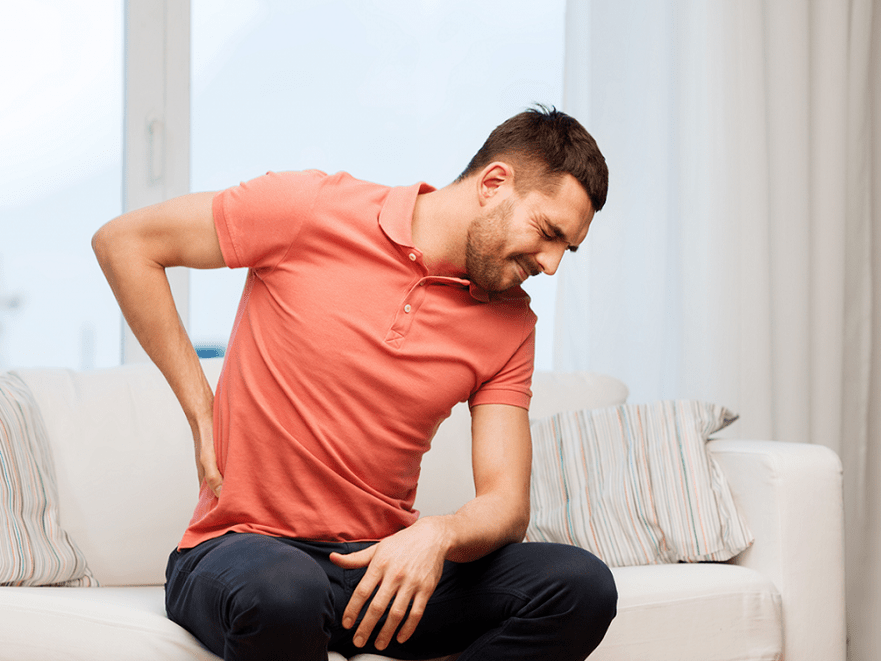
Low back pain can be related to many reasons - for example muscle damage, bowel problems, protrusion of the eye and herniated discs in the vertebrae. It is not possible to determine the exact cause on your own. Therefore, if unpleasant sensations occur, it is necessary to undergo diagnostics and follow the recommendations of the doctor. In most cases, medications and procedures are used to treat it. But surgery may also be needed.
Lower back pain: reasons
Lower back pain can involve the spine, muscles, nervous system, and other systems. The most common reasons are:
- Traumatic trauma to the lumbar region or other parts of the spine.
- Muscle tissue damage or severe stress.
- Hernia, protruding eyes.
- Curvature.
- Neuropathy
- Inflammatory process of vertebral tissues.
- Nerves are compressed.
- Pathology of the intestines, stomach, liver and other digestive organs (in this case, pain is also given to the lumbar region).
- Poisoning, poisoning.
- Pathologies of the excretory system - renal failure, pyelonephritis, cystitis, kidney stones, ureters.
- Diseases of the uterus - cysts, fibroids, inflammatory processes.
What to do if your lower back hurts
It is not possible to reliably determine the source of the pain at home. Therefore, in case of extrasensory perception, it is advisable to consult a doctor. If diagnosed early, treatment is successful and quick. You need to contact such specialists:
- Surgeon or traumatologist - if the pain is related to recent herbs, including household or sports herbs.
- Neurologist - painful sensations of an acute, shooting character. May be accompanied by problems with sensitivity in the legs, loss of mobility. Symptoms such as goosebumps on the surface of the abdomen or on the legs are also observed.
- Gastroenterologist - pain persists mainly on one side of the lower back. In addition, the sensation may be painful, accompanied by frequent or difficult urination.
- Gynecologist - in this case, the pain is observed from one side and from the other. Furthermore, they are associated with weakness, which is aggravated by walking and running, during menstruation and during pregnancy.
In rare cases, when the cause of the pain is objectively clear, you should not worry. Therefore, if the extrasensory sensations are related to prolonged lying in one position or physical activity, it is not necessary to consult a doctor. But if the pain does not go away within a few days or is acute in nature, it is important to seek medical attention as soon as possible and make a diagnosis.
Lower back pain: diagnosis
Diagnosis is indicated by the doctor after examination, examination of complaints and medical history. The need for a particular procedure depends on what symptoms accompany the pain:
- X-ray of the spine - hernia, protrusion, back injury, postural problems.
- Lower back MRI - to look for hernias, curvatures, trauma, as well as suspected cancer.
- Lower back CT scan - the same indications as an MRI scan.
- Ultrasound - suspect pathology of the intestines and other organs located in the abdominal cavity.
- Colonoscopy, gastroscopy - these studies are performed in cases of suspected gastrointestinal diseases. In this case, the doctor not only examines the organs, but may also take a tissue sample (biopsy) for further study.
- An intestinal MRI is done to further examine the digestive tract to confirm or verify a diagnosis that has been made previously.
Treatments
The method, time, and treatment regimen are decided by the doctor depending on the diagnosis. In most cases, the drug is prescribed, for example, non-steroidal anti-inflammatory drugs. In addition, you can participate in massage sessions, conduct physical therapy procedures.
If the diagnosis includes only surgical treatment, a surgery will be performed. This is necessary, for example, when there are hernias, peptic ulcers and other pathologies.
Back pain prevention
Low back pain can be related to work and lifestyle conditions. It is on the lumbar region that primary physical activity decreases. This is especially dangerous when constantly lifting weights, taking on sports or trauma in the family.
For prevention, it is recommended:
- Exercise regularly.
- If the job involves physical labor, learn how to lift weights properly and not overload your back.
- If work requires sitting for a long time, get up, walk, change positions often.
- Avoid reducing heat for the back area, dress appropriately for the weather.
- Keep your back straight while sitting and while performing the pose.
- Eat a balanced diet.
- Do not abuse alcohol, smoke or other bad habits.
If the pain recurs quite often and even acute in nature, you should immediately consult a doctor. It is important to understand that treatment often lasts several months, especially when recovering from surgery. In this case, you should adjust your lifestyle, if necessary, change your job.





































